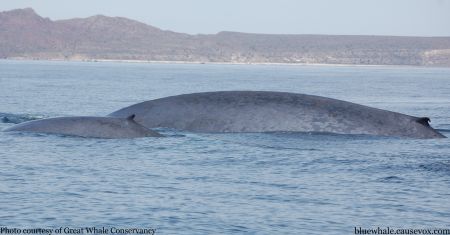Each blue whale has a unique pattern of spots on its back, like a fingerprint or a nametag. These spots allow researchers to identify each whale as either a newcomer, or an old friend.
The Mingan Island Cetacean Study (MICS) is a non-profit research organization located on the Gulf of St Lawrence's northern shore and they were the first group to begin long term study of marine mammals in the Gulf. Since their founding in 1979, this group has followed blue whale populations in eastern Canada, the Sea of Cortez and in the waters of Iceland.
MICS has discovered something troubling in the northwest Atlantic blue whale population. Of the 475 individual whales they've identified since their genesis in 1979, only 22 have been calves. This suggests a frighteningly low calving rate for a population already swimming on the brink.
Thirty-five years of study...and only 22 blue whale calves in all that time.
MICS founder Richard Sears said blue whales can calve every two years if external factors allow. In the Sea of Cortez (Gulf of California) 70 blue whale calves have been identified over the last 30 years. Even in the Gulf of St Lawrence other whale species enjoy higher calving rates.
"Humpbacks can have 10-20 calves sighted per season in the St Lawrence and there are probably more," said Sears. "Some years, finbacks have had as many as 14 calves sighted in the St Lawrence."
It's been estimated by the Department of Fisheries and Oceans there are fewer than 250 mature blue whales left in the northwest Atlantic population. This should not be confused with the figure of 475 mentioned above, which is the total number of blue whales identified over the last 35 years, not the population at any one time.
Sears said pollutants in the Gulf from industry and agriculture could be having some impact on blue whale reproduction, leading to the low calving rates, but this has not been demonstrated. For now the exact cause remains a mystery.
See also: Blue whale, black oil and the race for the Gulf
If you are interested in supporting this gentle giant, consider joining the Blue Whale Campaign: bluewhale.causevox.com



